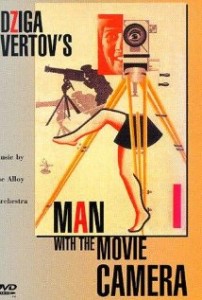
Exhibition about Dziga Vertov and his experimental movies in the Museum of Modern Art (15. April bis 4. Juni 2011)
Of all the masters of Soviet cinema—most notably Sergei Eisenstein, Lev Kuleshov, Vsevolod Pudovkin, and Grigori Aleksandrov—Dziga Vertov (né Denis Arkadievitch Kaufman, 1896–1954) is arguably the one whose still-radical experiments in image and sound, and enduring influence among an astonishing range of contemporary filmmakers and artists, from Jean-Luc Godard to Richard Serra to Steve McQueen, have yet to be fully appreciated or celebrated. MoMA’s retrospective, the most comprehensive ever assembled in the United States, seeks to redress this with an extensive selection of Vertov’s silent films, sound features, and related work by collaborators and rivals in what he called his “factory of facts.” International Vertov scholars, artists, and filmmakers including William Kentridge, Peter Kubelka, Guy Maddin, and Michael Nyman will offer a contemporary perspective on Vertov’s work and legacy by introducing screenings and participating in a panel discussion on May 7.
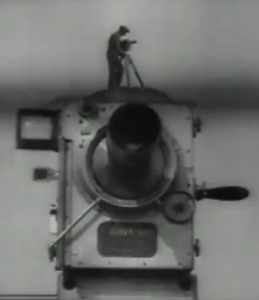
The exhibition opens on April 15 with the U.S. premiere of Man with a Movie Camera (1929), newly restored in its original full-frame version by the EYE Institute Netherlands and with live musical accompaniment by Dennis James & Filmharmonia Ensemble. A breathtaking and often startlingly funny vision of cosmopolitan life in Moscow, Kiev, and Odessa, Man with a Movie Camera remains among the most dynamic, and imitated, city symphonies in film history. Also featured are 11 programs of Vertov’s silent films, drawn primarily from the Austrian Film Museum’s unparalleled collection, including the premieres of fourteen Kino-Week films from 1918–19, and, for the first time together, all of his extant Kino-Pravda films from 1922–25, several of which are famous for Vertov and Aleksandr Rodchenko’s ingenious experiments in graphic design.
The exhibition continues with such masterworks as Stride, Soviet! (1926), A Sixth Part of the World (1926), The Eleventh Year (1928), Enthusiasm: Symphony of the Donbass (1930), Three Songs of Lenin (1935/38), and other sound films. Films by Vertov’s brothers, Mikhail and Boris Kaufman, as well as films by Joris Ivens and Albrecht Viktor Blum, are also presented. Among the exhibition’s many rediscoveries is the work of certain largely forgotten women filmmakers of the Soviet avant-garde, including Elizaveta Svilova, Vertov’s editor and wife, and Esfir Shub, who pioneered “found footage” cinema and was instrumental in the development of dialectical montage. Vertov’s exhilarating body of work must be seen not as a succession of individual films, but as one continuously evolving movie; “free of the limits of time and space,” he wrote, it would lead to “a fresh perception of the world” and a revolutionary passage from the Old to the New.
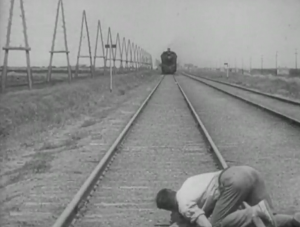
All films directed by Vertov, except where noted, and with simultaneous English translation or electronic subtitles. Screening descriptions adapted from texts by Yuri Tsivian and others, principally from the 23rd Pordenone Silent Film Festival catalogue.
Organized by Yuri Tsivian, William Colvin Professor at The University of Chicago, and Joshua Siegel, Associate Curator, Department of Film, The Museum of Modern Art, in close collaboration with the Austrian Film Museum, Vienna. Organized in cooperation with the Austrian Cultural Forum New York.
Filmlist:
A Special Man with a Movie Camera Film Concert by Dennis James & Filmharmonia Ensemble
Chelovek s kinoapparatom (Man with a Movie Camera)
1929. USSR. Dziga Vertov. 65 min.
Kino-Pravda, nos. 1–8
1922. USSR. Dziga Vertov. Approx. 71 min.
Kino-Glaz (Zhizn Vrasplokh) (Kino-Eye (Life Off-Guard))
1924. USSR. Dziga Vertov. Approx. 70 min.
Entuziazm (Simfonija Donbassa) (Enthusiasm: Symphony of the Donbass)
1930. USSR. Dziga Vertov. 65 min.
Tri pesni o Lenine (Three Songs of Lenin)
1934/38. USSR. Dziga Vertov. 67 min.
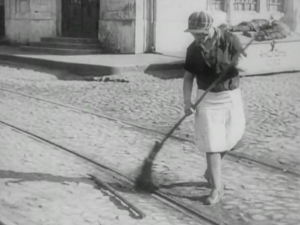
Vertov Filmed in Person
1922/1923/post-1930. USSR. Approx. 1 min.
Vertov Interviews
Post-1935. USSR. Approx. 1 min.
Kinonedelja (Kino-Week) nos. 1, 3, 4, 5, 21–25
1918. Russia. Dziga Vertov. Approx. 72 min.
Kinonedelja (Kino-Week) nos. 31–35
1919. Russia. Dziga Vertov. Approx. 62 min.
Kino-Pravda [excerpts]
1930s. USSR. Dziga Vertov. Approx. 16 min.
Kino-Pravda nos. 9–11, 13 (“Yesterday, Today, Tomorrow”: A Film Poem Dedicated to the October Celebrations)
1922. USSR. Dziga Vertov. Approx. 90 min.
Heart of the World
2000. Canada. Guy Maddin. 6 min.
Kino-Pravda nos. 18, 20–22
1924–25. USSR. Dziga Vertov. Approx. 90 min.
Kino-Pravda nos. 14–17
1922–23. USSR. Dziga Vertov.
Segodnia (Today)
1923. USSR. Dziga Vertov.
Sovetskie Igrushki (Soviet Toys)
1924. USSR. Dziga Vertov.
Padeniye Dinasti Romanovikh (The Fall of the Romanov Dynasty)
1927. USSR. Esfir Shub. 101 min.
Kino-Pravda No. 23 (Radio Pravda)
1925. USSR. Dziga Vertov. Approx. 23 min.
Shagai, Sovet! (Stride, Soviet! (The Moscow Soviet in the Present, Past, and Future))
1926. USSR. Dziga Vertov. Approx. 70 min.
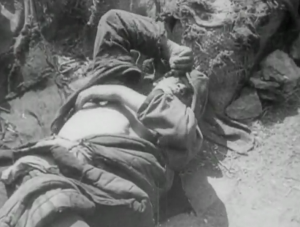
Shestaia chast mira [“Probeg Kino-Glaza po SSSR.” “Eksport i import gostorga SSSR.”] (A Sixth Part of the World (“A Kino-Eye Race around the USSR.” “Export and Import by the State Trading Organization of the USSR”))
1926. USSR. Dziga Vertov. Approx. 60 min.
Kino-Pravda no. 19
1924. USSR. Dziga Vertov. Approx. 18 min.
Les Halles centrales
1927. France. Boris Kaufman. Approx. 7 min.
Moskva (Moscow)
1926. USSR. Mikhail Kaufman, Ilya Kopalin. Approx. 66 min.
